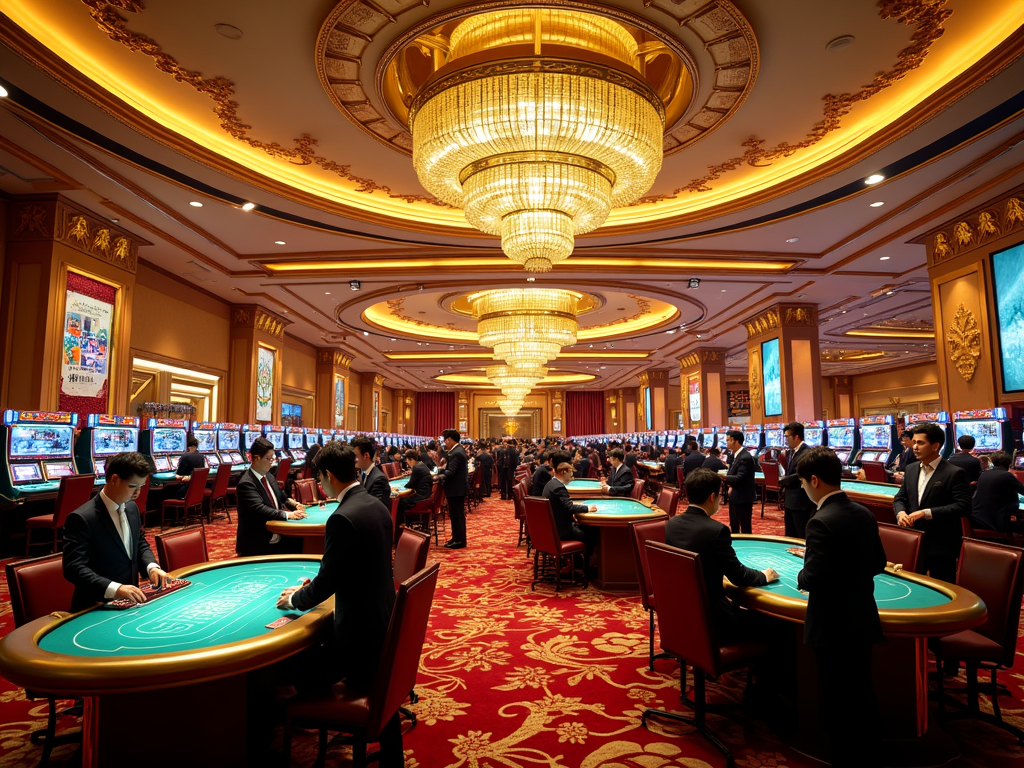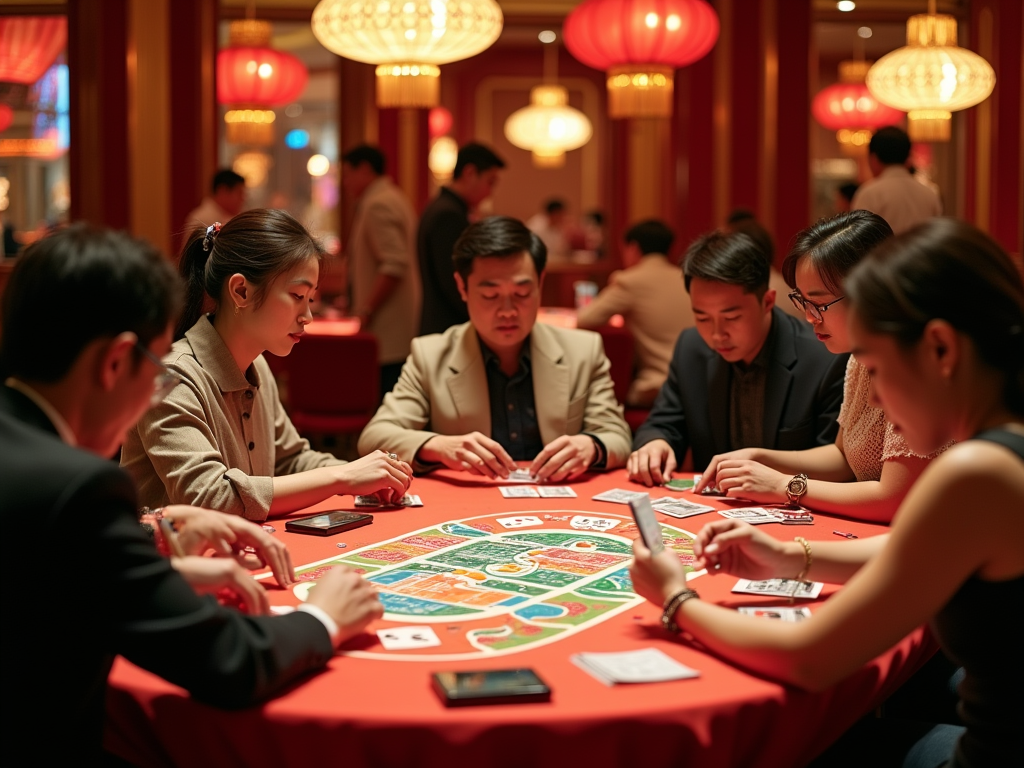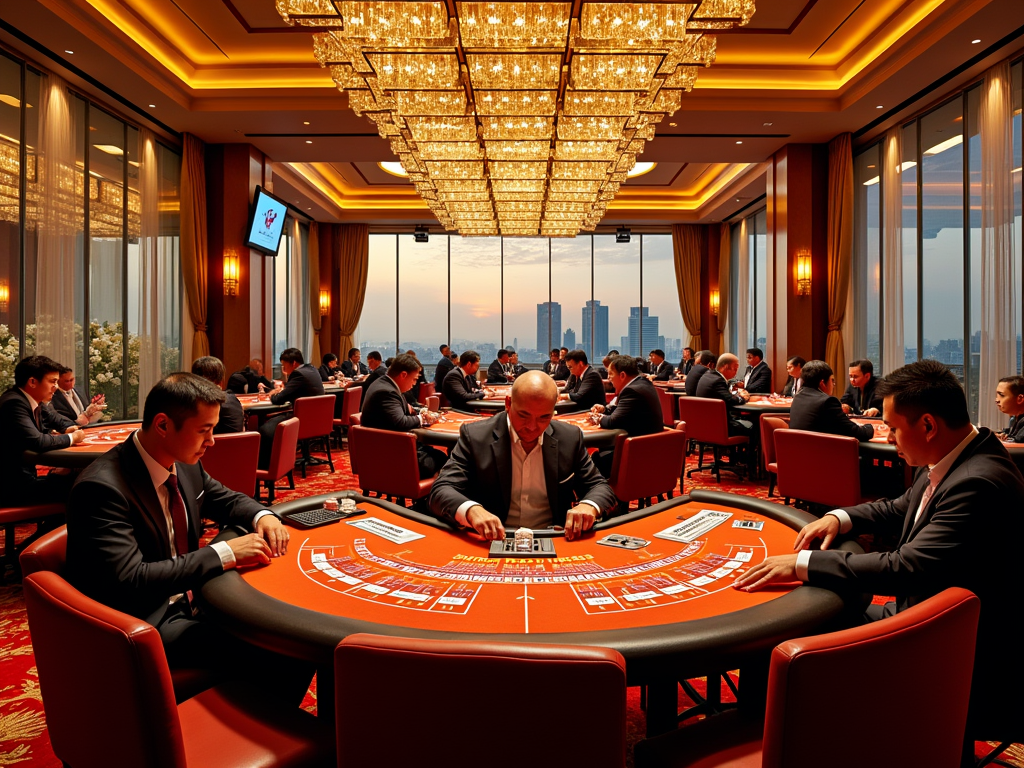Baccarat: The Lifeblood of Macau’s Gaming Industry
Baccarat stands as the core of Macau’s gaming sector, generating an astounding 85-90% of total gaming revenue and anchoring the city’s economic stability. With its simple rules and alignment with Chinese cultural beliefs centered around luck and destiny, baccarat creates an irresistible draw for gamblers across Asia. This unique blend of tradition and entertainment fuels Macau’s rise as a global gambling powerhouse.
Key Takeaways
- Baccarat contributes 70-80% of Macau’s government tax revenue, funding crucial public services and infrastructure
- The game’s basic structure and reliance on chance align with Chinese cultural values
- High-stakes baccarat accounts for 60-70% of regional gaming revenue, driven by VIP and premium play
- Players enjoy favorable odds with a 1.06% house edge on Banker bets and 1.24% on Player bets
- Traditions like card squeezing and fast-paced gameplay create an electrifying atmosphere at Macau’s baccarat tables
A Game for Everyone
The simplified mechanics of baccarat attract both casual gamblers and affluent high-rollers. Its cultural significance builds deep emotional connections with many Asian players, reinforcing the game’s enduring popularity. With its relatively low house edge and emphasis on fortune rather than skill, baccarat offers an appealing mix of entertainment and the potential for significant returns.
Wider Economic Impact
Baccarat’s influence reaches far beyond the gaming floor. It drives massive tax contributions that fund critical public works, while helping shape Macau as a top-tier entertainment destination. The influx of premium tourists drawn to baccarat contributes to the region’s hospitality, retail, and transportation sectors, reinforcing its status as a cornerstone of the city’s economic ecosystem.
Inside Macau’s Baccarat Empire: The Game That Powers a City
The Financial Dominance of Baccarat
Baccarat stands as the undisputed king of Macau’s casino floors, generating a staggering 85-90% of the city’s total gaming revenue. This isn’t just a slight preference – it’s an overwhelming economic force that shapes the entire gaming landscape of Asia’s gambling capital.
The numbers tell a compelling story. According to the Gaming Inspection and Coordination Bureau (DICJ), Baccarat’s contribution to Macau’s gross gaming revenue (GGR) consistently dwarfs all other casino games combined. While slot machines and blackjack maintain their loyal following, they barely make a dent in comparison to Baccarat’s massive financial footprint.
Let’s break down what makes Baccarat such a powerhouse in Macau:
- High-stakes tables regularly see bets reaching millions of dollars per hand
- VIP and premium mass Baccarat rooms operate around the clock
- The game’s fast pace allows for more hands per hour compared to other table games
- Cultural preferences in Asian markets strongly favor Baccarat’s straightforward gameplay
The sheer scale of Baccarat’s dominance becomes even clearer when looking at the pre-pandemic figures. The DICJ reports that during peak periods, Baccarat tables generated more revenue in a single day than most other games did in an entire month. This remarkable performance isn’t just about the high-roller rooms – even mass-market Baccarat tables consistently outperform other gaming options.
I’ve witnessed firsthand how casino operators prioritize their Baccarat offerings, dedicating prime floor space and resources to meet the intense demand. The game’s popularity drives everything from casino design to marketing strategies, creating a self-reinforcing cycle that cements Baccarat’s position at the heart of Macau’s gaming industry.

The Ancient Art of Luck: Why Chinese Players Choose Baccarat
Chinese cultural values deeply shape how players approach casino games, with luck and fate standing as central pillars in gambling choices. I’ve noticed that Baccarat’s popularity stems from its perfect alignment with traditional Chinese beliefs about fortune and destiny.
Cultural Connection to Fortune
The game’s straightforward nature makes it incredibly appealing to players who put their trust in fate rather than complex strategies. At Baccarat tables, I’ve witnessed players performing various rituals — from gently peeking at cards to blowing on them for good luck. These practices aren’t just superstitions; they’re meaningful expressions of cultural beliefs about controlling destiny.
Roadmaps have become an essential part of the Baccarat experience in Chinese gaming culture. Players huddle around tables, carefully studying the bead plate, big road, and small road patterns. These visual tracking tools create a shared experience where players feel connected to both the game and each other, reinforcing the communal aspect that’s so vital in Chinese society.
The Psychology of Chance vs. Skill
Here’s what makes Baccarat particularly attractive to players who value luck over skill:
- The game requires minimal decision-making, letting fate take center stage
- Players can join or leave at any time without disrupting strategy
- The collective energy at the table creates a shared emotional experience
- The straightforward betting options keep the focus on intuition rather than complex calculations
The psychological pull of Baccarat lies in its simplicity. Unlike poker or blackjack, where players must master numerous strategies, Baccarat offers a pure chance-based experience. This alignment with fate-focused thinking explains why many Chinese players prefer it over games that demand strategic thinking.
I’ve observed that the communal atmosphere at Baccarat tables strengthens these cultural connections. Players often celebrate wins and commiserate losses together, creating a shared experience that’s deeply rooted in Chinese social values. This collective participation, combined with the game’s emphasis on luck, creates an environment where cultural beliefs about fortune can flourish.

The Secret World of High-Stakes Baccarat
High-stakes baccarat holds a special place in Macau’s casino landscape, driving an incredible 60-70% of the region’s total gaming revenue. This dominance stems from a unique combination of cultural preferences and high-roller appetites.
The Rise and Evolution of VIP Gaming
Behind the glamorous facade of Macau’s VIP rooms lies a sophisticated network built on relationships and credit. Junket operators acted as the key players in this ecosystem, forming connections between wealthy mainland Chinese players and casinos. These operators didn’t just find players – they created an entire financial infrastructure.
Here’s how the VIP system shaped Macau’s gaming landscape:
- Junkets provided substantial credit lines to players, often reaching millions of dollars
- They handled all aspects of debt collection, removing risk from the casinos
- Operators curated exclusive experiences, including luxury accommodations and private gaming rooms
- They maintained extensive networks across mainland China to recruit wealthy players
The system worked brilliantly until recent years when regulatory changes transformed the landscape. The Chinese government’s increased scrutiny of capital outflows and gaming activities has led to stricter oversight of junket operations. This shift hasn’t just affected how high-rollers play – it’s fundamentally changed Macau’s gaming focus.
I’ve noticed a clear pivot toward mass market and premium mass segments. These players don’t require the same credit facilities but still place significant bets. They’re often successful entrepreneurs or business owners who prefer to play with their own money rather than borrowed funds.
The transformation has pushed casinos to adapt their high-stakes offerings. Private gaming rooms still exist, but they’re now directly managed by the casinos rather than junket operators. This direct relationship between the casino and player has created a more transparent, regulated environment for high-stakes gaming.
This evolution shows how Macau’s baccarat scene isn’t static – it’s constantly adapting to new regulations and market conditions while maintaining its position as the preferred game of Asian high-rollers. The future of high-stakes baccarat in Macau looks different from its past, but its central role in the gaming industry remains unchanged.
Why Baccarat’s Simple Rules Create Big Excitement
Basic Rules and Betting Options
Baccarat’s magnetic pull comes from its crystal-clear rules — you’ll pick between betting on the Player hand or the Banker hand to win. The straightforward nature of these choices lets you focus on the thrill rather than getting tangled up in complex strategies. Smart players pay attention to the odds: betting on the Banker gives you the best shot with just a 1.06% house edge, while the Player hand sits at 1.24%. Though tempting, that Tie bet comes with a steep 14.36% house edge — not the best move for your bankroll.
Cultural Rituals and Fast-Paced Action
The real magic happens during the card squeeze — it’s not just about revealing numbers, it’s a ritual that adds suspense to every hand. Players lean in, hold their breath, and slowly peek at the cards’ edges. This dramatic reveal has turned into a cherished tradition, especially in Asian gaming culture. You’ll feel your heart racing as each card comes into view.
The game keeps you on your toes with its quick pace. Here’s what makes it so engaging:
- Fresh hands start every minute or so
- Multiple betting spots let you spread your action
- Side bets add extra layers of excitement
- The 5% commission on winning Banker bets creates strategic decisions
- Results come quickly, letting you adjust your strategy on the fly
The combination of rapid gameplay and consistent betting opportunities creates an electric atmosphere you won’t find at other casino tables. Each new hand brings a fresh chance to win, and the steady stream of action means you’re always in the game.
How Baccarat Shapes Macau’s Economy
Baccarat’s Dominant Revenue Impact
Baccarat stands as the cornerstone of Macau’s financial foundation, generating an astounding 70-80% of the government’s total tax revenue. This single card game powers Macau’s economic engine far beyond what casual observers might expect. The game’s influence reaches into every aspect of daily life in this vibrant gaming destination.
Comparative Economic Scale
The financial impact of Baccarat in Macau sets it apart from other major gaming destinations. While Las Vegas and Singapore maintain diverse gaming portfolios, Macau’s specialized focus on Baccarat creates a unique economic model. This concentrated revenue stream funds critical public services across the region, including:
- Healthcare facilities and medical services
- Public transportation infrastructure
- Educational institutions and programs
- Social welfare initiatives
- Urban development projects
The game’s economic significance shapes governmental planning at every level. Budget allocations for major infrastructure projects depend heavily on Baccarat’s performance in Macau’s casinos. Local officials must carefully monitor these revenue patterns to make informed decisions about public spending and development initiatives.
This deep connection between Baccarat and Macau’s fiscal health creates both opportunities and challenges. During prosperous gaming periods, the government can fund ambitious development projects and enhance public services. However, any significant downturn in Baccarat revenue can quickly ripple through the economy, affecting everything from construction projects to social programs.
The relationship between Baccarat and Macau’s economy showcases how a single casino game can become the backbone of an entire region’s financial system. This unique economic model has transformed Macau into a specialized gaming destination where Baccarat isn’t just a game – it’s the primary driver of fiscal stability and growth.

Sources:
Gaming Inspection and Coordination Bureau (DICJ) – “http://www.dicj.gov.mo/web/en/information/index.html”
Reuters – Articles under “https://www.reuters.com/markets/asia”
Bloomberg – Articles under “https://www.bloomberg.com/asia”
South China Morning Post (SCMP) – “https://www.scmp.com/news/hong-kong/economy”
GGRAsia – Articles under “https://www.ggrasia.com”





